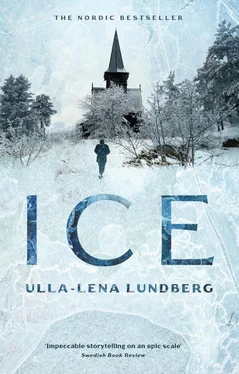And sure enough, as Berg notes, Skog takes the first opportunity to give orders and take charge. As soon as he hears the newcomers in the hallway, he goes out and starts to confer in a loud whisper. “Yes, it’s almost time. I’ll get the family moving. Tactfully, of course. One needs to use psychology on these occasions.” Deliriously self-satisfied, he is convinced that nothing will happen unless he makes it happen. In fact, the organist is already talking to Frej, and the three pallbearers from the family move out to the hall to meet those from the Örlands. “We’ll take out the coffin now. We’ll manage. The steps are the worst. Careful you don’t slip in your leather shoes. The verger sanded, but it’s still treacherous.”
There are teachers and office workers in the funeral procession, and even they are looking at their watches. Mona is helping Sanna into her coat and cap, then she reaches for her hat, her veil still thrown back, and puts on her own coat. “Now we can go,” she says, impatiently, in the direction of the parlour. And it’s suddenly crowded in the front hall, sweaters and coats and hats, five fluttering veils, burial wreaths in hands. “Do we have everything? Come, Sanna. I’ll hold your hand.”
Sister Hanna watches them go with Lillus on her arm. Although everyone wants to attend the funeral, someone has to make the sacrifice and stay home with Lillus. Crying hard, she stretches out her arms towards them when she sees they’re leaving, but not even Sanna cares, they just close the door and disappear. Outside, Mona nods to the pallbearers and, solemnly, they take their place around the coffin. They give it a trial lift and look at each other—yes, we’re ready. The organist raises his hand towards the bell tower. The pallbearers start to move. The bell-tower bays are open, and the bells start to swing, the first stroke of the clapper against the side of the big bell muffled and stiff with cold. But then the speed picks up, both bells together, dark and light, the little bell scrambling above the weight of the big bell’s authority, together the preponderant bright tone that is the distinctive sound of Örland church. The people up on the crown of the hill stop to let the funeral procession pass, those in the churchyard turn their faces towards the parsonage, the first hats and caps come off.
This is what they see: the coffin white, the mourners black, the little girl hidden behind the wreaths. A collective gesture as the women sweep their veils forward over the brims of their hats. The pallbearers coax the coffin down the steps and begin their steady pace. One more priest leaves the Örlands. The widow with her daughter, the parents, the siblings, the in-laws, Uncle Isidor. The organist wrings his hands to keep them warm enough to play. Nothing is spared them, every stone on the path, every grain of sand on the ice, every gust of wind, every freezing degree of chill, every peal of the bells, every second—they must suffer all of them, one by one.
The gates to the churchyard stand open, but in keeping with local custom, the coffin is set down on the coffin stone outside. The bells go silent, the two visiting priests and the organist meet the procession. When everyone has gathered around the bier, they sing, with the courage of despair, “Into Thy Mercy, Gentle Lord”, and when the first verse is finished, the bells ring, the bearers lift the bier, and, singing, the people follow it across the churchyard and into the church.
By local tradition, funerals are to be conducted at the grave, but on this occasion, because of the many speeches and the considerable crowd, and because the dead man so loved his church, they are adopting a more modern custom and holding the funeral inside the building. The first pews are reserved for the immediate family, but otherwise the church is full to capacity and well beyond, the pews crowded, people standing at the back and on the stairs to the loft. The whole parish is here, and they surge to their feet when the coffin enters, escorted by Berg and Skog. The relatives take their places, the organist pushes through the crowd to the organ. The pumper is ready, though the whoosh of air cannot be heard over the rustling down in the church. The organist put his icy hands on the keyboard, hesitates, strikes a chord. The verger in his place. Skog in command by the coffin.
And now the congregation sings the way the dead man liked to hear them, for the last time, it seems to them. From deep down, broken by tears, but always some of them carrying the tune. They bray and drift, embroider and slip, fall behind or rush ahead, drag the organist with them, run out of breath on the high notes, gasp in unison for more, go silent when the words in the hymnal come to an end.
Skog full of importance, Berg uneasy, unseeing, in the first pew. Skog in the pulpit. “The Lord makes no mistakes,” he proclaims, and Mona’s heart stops beating in her breast. “Does he not say himself that we do not comprehend what comes to pass, but that later we shall do so? When we stand face to face with the Divine. Here on earth, our life is divided. We belong to two kingdoms. A kingdom of sin and death. But we belong also to the kingdom of forgiveness and of life. Everything in life is marked by corruption. These walls are thick, but they will nevertheless decay and fall to pieces. All those who lie in their beds outside in the churchyard are dust. Human life is like a flower—it thrives in the morning and dies in the evening and our body is destroyed.
“As I stand here and look at you, I know you all. But I also see that you have the mark of death in your faces. It is stamped on your features. But as the forces of decay do their work, it is good to remember what my successor has said to you from this very pulpit about the power of life and forgiveness. Now he is gone. He was taken from you just when everything seemed at its best. Weep! But not as they weep who have no hope, rather as they who have hope and know they will meet again on Judgment Day.”
After Skog’s homily, the church choir sings “Nearer My God to Thee” from the loft. They’ve been deprived of their most beautiful soprano and their deepest bass, and in the course of the hymn some voices break off completely and are replaced by deep sobs. “Still all my song shall be” is dreadfully shrill, a harrowing depiction of the defencelessness of anyone who has no other hope but God’s uncertain mercy.
For Fredrik Berg, it’s not as hard as expected to stand up and take his place beside the coffin with paper and prayer book in hand, look at Mona behind her black veil, Sanna a white smudge, and begin. “Anyone who ever met Petter Kummel will always remember the deep and powerful joy that he conveyed. He was open and accessible, and his piety was as honest as his firm handshake and as unaffected as his unpretentious simplicity. He loved his congregation and saw service to all of you as his mission in life.”
Well on his way, his voice steady and clear, the acoustics superb despite the high humidity from the large gathering, he speaks about how much Petter would have liked to live with his family and in his parish, and he describes the night of the death struggle and the spring morning that dawned when the tragedy was complete. In the same way that Easter morning comes to us with its message of the resurrection after the dark night of Good Friday. His warmth and sincerity are no pretence as he turns towards Mona and Sanna and lets his eyes dwell briefly on the weeping parents and siblings.
“Lift up your eyes and cry out to God—and God’s love, which passeth all understanding, will carry you in the eternal arms of the Father. Petter Kummel, whom we now consecrate to the peace of the grave, is also encompassed in God’s love.” An ancient ceremonial, words polished down to their absolute core. “Earth to earth, ashes to ashes, dust to dust, in sure and certain hope of the resurrection unto eternal life, through our Lord Jesus Christ.” Three handfuls of the thin, greyish soil of the Örlands form a cross on the coffin’s white covering. A hesitant hymn: “Our Years, They Flee Away”.
Читать дальше












